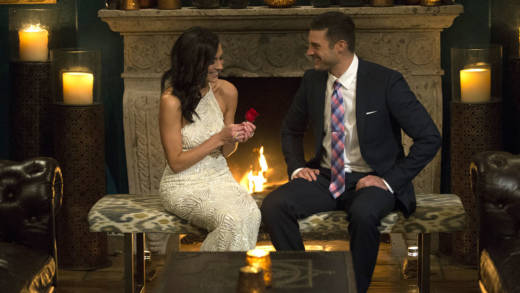One Huffington Post blogger cited her primary reason for watching as: "the hope of a happy ending." Talking to AdAge in 2015, Robert Mills of ABC Entertainment said he thought fan influence over the shows was a major popularity factor. "The audience has become a silent producer," he said. "They help decide who the leads should be, the kind of dates they want to see; it really makes them feel they are on the journey together."
There's no doubt that all of the above contribute to the Bachelor/ette's appeal, but there may be more significant societal factors at play as well. Neither show has ever shifted from its original format, despite the myriad ways the world has drastically changed since the show first premiered. Tinder came along in 2012 and radically transformed American dating. #BlackLivesMatter has shone a light on everyday inequalities faced by people of color since it started in 2013. Marriage equality was achieved in 2015. Birthrates reached their lowest point ever in 2017. The post-Women's March feminist swell has been unstoppable since the day after President Trump's election. The gender spectrum is no longer a fringe conversation. Polyamory is no longer considered an obscure lifestyle.
And yet, The Bachelor/ette continues to be a strictly heterosexual world, in which lifelong, licensed monogamy is the ultimate end goal. It's a bubble in which old-fashioned courtship is still standard practice, and traditional gender roles remain firmly intact (it's the man's job to propose, even on The Bachelorette). There are always discussions amongst contestants about future children. And overwhelmingly, most of the people involved are white. The few people of color who do get included don't generally last long. (In 2016, Splinter News reported that: “In the history of the franchise, on both The Bachelor and The Bachelorette, a black contestant has never lasted longer than five weeks. In fact, more than half -- 59% -- of black Bachelor and Bachelorette contestants leave the shows within two weeks.”) The Bachelorette may have cast their first African-American lead in 2017, but The Bachelor has yet to do so.
The majority of The Bachelor/ette's viewers have always been women. In 2013, BroadcastingCable.com presented viewer statistics to prove it: "The Bachelor averages a 2.7 in the 18-49 demo, but among women in the demo averages a 4.0." In 2015, ShowBuzzDaily reported: "The Bachelor is one of the youngest-skewing shows on ABC, delivering substantial numbers of females 12-34 (quite rare for ABC)."
One can presume that many of these women are seeking an escape from the complexities of modern dating, with all of its swiping, unsolicited photos and lack of resemblance to what girls were told to expect from dating, growing up. The men watching might enjoy the old-fashioned gender roles for entirely different reasons. But there is also likely a significant element here of using The Bachelor/ette as a means to hang onto the idea of a bygone America in general.
In 2015, Nielsen ratings listed The Bachelor as Number 1 in a chart titled "What the Young & Rich Watch." At the time, Deadline explained that the show did "a 111% higher rating in 150K+ homes than it [did] in regular demo ratings.” Given the fact that the Huffington Post cited data in 2016 from the American National Elections Studies to demonstrate that "the rich tend to be far more conservative than the average American," it makes sense that wealthy people, in particular, would love these shows. It's one of the only things left on primetime TV in 2018 that continues to present so many old-fashioned American values as still the norm.
It's true that the ratings of both shows have dropped, but that's mostly because TV ratings have been dropping across the board. The Bachelorette started in 2003 with an average viewership of 16.65 million. By 2017, that number had dropped to 5.89 million. The Bachelor has fared better, having fluctuated between an average of roughly 8 and 13 million viewers throughout its history. In 2016, Variety reported: "The Bachelor continues to stomp the competition," and 2018's Season 22 finale brought in ABC's best figures of the season.


